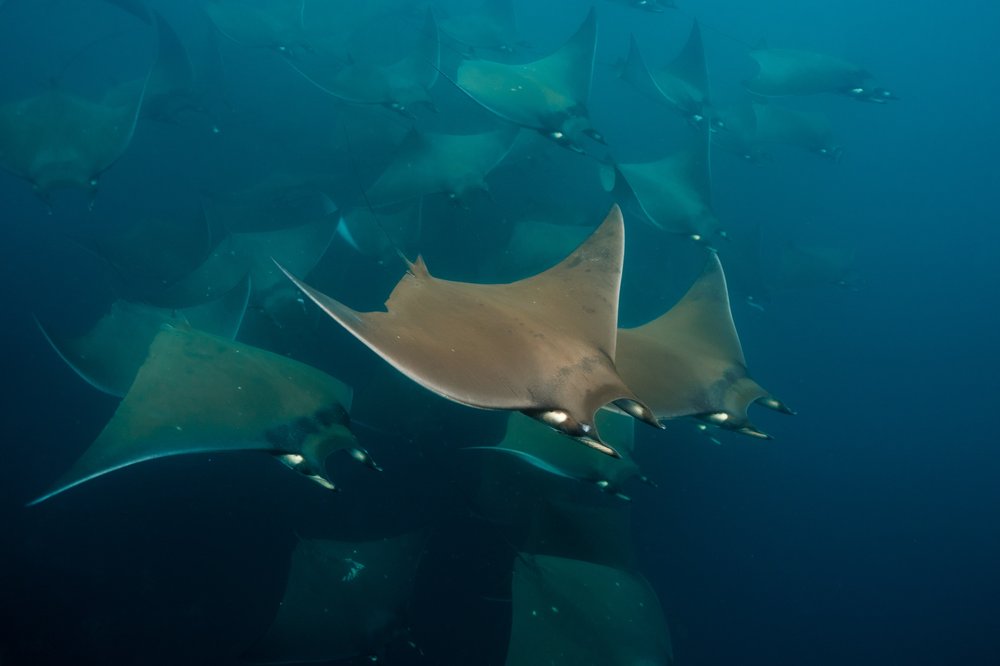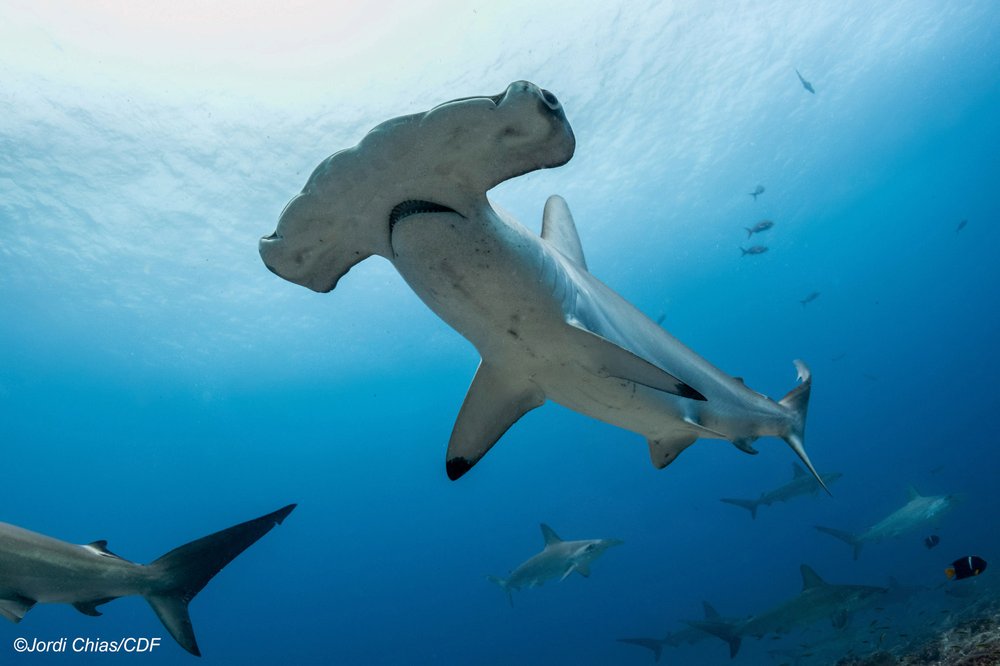The Charles Darwin Foundation and WWF launch project "Habla Tiburón" to promote the conservation of sharks and rays and empower fishing communities in mainland and insular Ecuador
The Charles Darwin Foundation and the World Wide Fund for Nature, WWF-Ecuador, are pleased to launch a new development project, made possible by the United States government via the US Agency for International Development (USAID), that aims to strengthen fisheries governance, promote responsible fishing practices, and thus drive the conservation of sharks and rays in Ecuadorian waters.
The project, worth $11.9 million over five years, seeks to empower fishing communities in mainland and insular Ecuador to become leading commercial hubs for responsibly sourced seafood in the region and internationally, while reversing the severe population declines in sharks and rays observed globally and in the Eastern Tropical Pacific in recent decades.
Dr. Rakan Zahawi, Executive Director of the Charles Darwin Foundation said: "We are thrilled to join forces with WWF and USAID to address this global issue that not only puts the survival of sharks and rays at risk but also threatens entire communities along the Ecuadorian coasts that rely on a healthy ocean to sustain their families. We are grateful for and applaud USAID's decision to support this innovative project."

Dr. María José Barragán, Science Director of the Charles Darwin Foundation, added: "The decline in the global population of sharks and rays observed in recent decades is threatening the survival of these species that play a vital role in maintaining the health of marine ecosystems. Restoring their populations is therefore a priority for conservation. This project is unique opportunity for Ecuador to show the world that, through innovative ideas, effective regulatory frameworks, and viable alternatives, fishing communities can develop more sustainable fishing practices while simultaneously promoting the conservation of these threatened species."
The project will be implemented by the Charles Darwin Foundation, which has been at the forefront of shark conservation and sustainable fisheries research for over two decades in the Galapagos Islands. The project will be implemented in collaboration with WWF-Ecuador, which has extensive experience along the Ecuadorian coast and in Galapagos, working hand in hand with businesses, government authorities, the fishing sector, and local communities to promote the establishment of robust and participatory governance frameworks, as well as coordinating the execution of fisheries improvement projects, including artisanal fisheries.
Tarsicio Granizo, Director of WWF-Ecuador highlighted: “Responsible fishing practices allow for the protection of marine life and its oceanic habitats, while at the same time supporting the livelihoods of those who depend on the sea. Ecuador is currently the world's leading producer and exporter of shrimp, the second-largest tuna processor, and possesses one of the most powerful artisanal and industrial fishing fleets in the region. Ecuador therefore plays a key role in fisheries management decision-making and has the opportunity to shape the future for sharks and rays, which are the second most threatened group of vertebrates on the planet.”
Daniel Sánchez, Director of USAID Ecuador, added: “Many view Ecuador as an Andean and Amazonian country, but it’s in fact a maritime-coastal nation. Ecuador's Exclusive Economic Zone is 5.5 times larger than its land area, bringing significant economic benefits. Ecuador consistently ranks among the top ten countries in tuna catch and is a leading exporter of tuna products. The country boasts a large fleet of artisanal fishing vessels, with no fewer than 45,000 boats, employing over 90,000 fishermen directly. This benefits around 400,000 people and generates over $550 million in revenue for the country. However, the threat of Illegal, Unreported, and Unregulated (IUU) fishing of sharks and rays jeopardizes Ecuador's legal trade in seafood products as well as the sustainability of fisheries. Today marks the beginning of a great opportunity: the "Habla Tiburón" project is just getting started and in the coming months, we will not only witness the start of conservation efforts necessary to ensure the viability of sharks and rays through sustainable fishing practices, but also the development of plans for the inclusion of women and other historically marginalized groups in the seafood supply chain.”

The project is being launched today in the Galapagos Islands, where the highest shark biomass in the world is documented, highlighting the abundant variety of highly migratory species that journey through Ecuadorian waters.
The project will integrate a gender perspective and the participation of vulnerable populations as direct beneficiaries.
Funding from the United States government via the USAID will be complemented by matching donations from various contributors such as the COmON Foundation, Save Our Seas Foundation, Mark and Rachel Rohr Foundation, The Darwin and Wolf Conservation Fund, and an anonymous donor.
Media contacts:
Charles Darwin Foundation
María José Utreras, Communications and Marketing Coordinator
comunicacion@fcdarwin.org.ec | +593 98 408 7697
WWF-Ecuador
Paula Carrillo, Communications
paula.carrillo@wwwf.org.ec | +593 98 170 5120
USAID
Communications Department |press@usaid.gov
U.S. Embassy and Consulate in Ecuador
Public Affairs Section – Press | contactoprensa@state.gov
About the Charles Darwin Foundation
The Charles Darwin Foundation for the Galapagos Islands is an international nonprofit that has been present in the Galapagos since 1959, thanks to an agreement with the Government of Ecuador. Its mission is to tackle the greatest threats and challenges to Galapagos through scientific research and conservation action, in order to safeguard one of the world’s most important natural treasures. At present, CDF manages over 25 research and conservation projects and is the custodian of more than 135,000 specimens within its Natural History Collections.
About WWF
WWF is an organization with a global network active in over 100 countries. In Ecuador, it was the first global organization to invest in conservation in 1962. Currently, WWF-Ecuador focuses on three strategic and complementary lines of action, aiming to work towards a more inclusive, secure, and healthy future for Ecuadorians: responsible markets and sustainable livelihoods; species and ecosystem conservation; and mobilization of society for sustainability.





